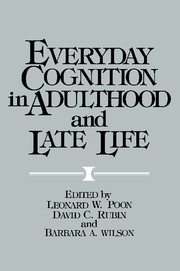Book contents
- Frontmatter
- Contents
- List of contributors
- Preface
- Part I Adult cognitive abilities in the laboratory and in real-life settings: Basic theoretical and methodological issues
- Part IA Systematic approaches to laboratory and real-world research
- Part IB Combining laboratory and real-world research
- Part II Cognition in adulthood and late life: Findings in real-life settings
- Part IIA Everyday cognitive abilities
- Part IIB Concomitant influences
- Part III Cognitive enhancement and aging: Clinical and educational applications
- 27 Introduction to Part III: Approaches to practical applications
- Part IIIA Issues and perspectives
- Part IIIB Enhancement approaches
- Part IIIC Designing programs for cognitive rehabilitation
- Subject index
- Author index
27 - Introduction to Part III: Approaches to practical applications
Published online by Cambridge University Press: 05 October 2013
- Frontmatter
- Contents
- List of contributors
- Preface
- Part I Adult cognitive abilities in the laboratory and in real-life settings: Basic theoretical and methodological issues
- Part IA Systematic approaches to laboratory and real-world research
- Part IB Combining laboratory and real-world research
- Part II Cognition in adulthood and late life: Findings in real-life settings
- Part IIA Everyday cognitive abilities
- Part IIB Concomitant influences
- Part III Cognitive enhancement and aging: Clinical and educational applications
- 27 Introduction to Part III: Approaches to practical applications
- Part IIIA Issues and perspectives
- Part IIIB Enhancement approaches
- Part IIIC Designing programs for cognitive rehabilitation
- Subject index
- Author index
Summary
In Part III, we consider ways of compensating for everyday memory failures and discuss methods for improving memory. We begin by looking at some of the issues involved, continue with reports of studies designed to enhance memory in the normal elderly, and conclude by examining memory programs for those with acquired brain damage.
The opening chapter in Part III is by Lars Bäckman, of the University of Umea, Sweden. He discusses types of compensation strategies used by older adults in episodic remembering. Bäckman provides a scholarly text that suggests that although the elderly do less well on many memory tasks than younger people, they are nevertheless able to compensate for some of their memory deficits. They do this in three major ways. First, they may pick up on the support provided by experimenters. For example, scores on paired-associate learning tasks can be improved by responding positively to a tester 's prompts and cues. Second, compensation may occur through properties inherent in the task itself. Thus, for example, when elderly subjects are asked to recall a series of actions they have watched, their recall is inferior to that of younger subjects, but if the elderly subjects perform the actions themselves, the age effect is eliminated. Third, the elderly may compensate through cognitive support systems. It can be argued, for instance, that elderly chess players compensate for encoding and retrieval deficits by better global evaluation of positions.
Information
- Type
- Chapter
- Information
- Everyday Cognition in Adulthood and Late Life , pp. 499 - 506Publisher: Cambridge University PressPrint publication year: 1989
